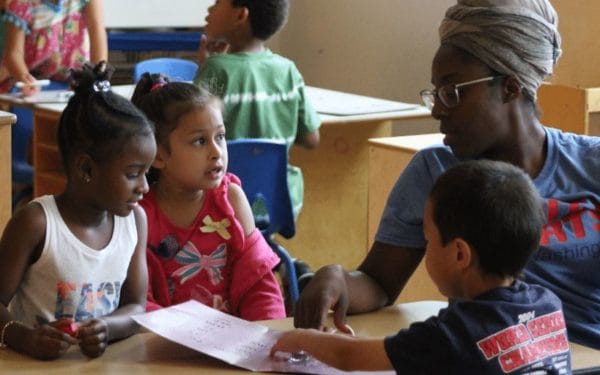November 9, 2020
By Aleta Margolis, Founder and President, Center for Inspired Teaching
Hooray for Monday is a weekly blog filled with questions, ideas, reflections, and actions we can all take to remodel the school experience for students.

On Saturday night, as Vice President-Elect Kamala Harris took the stage to deliver her victory speech, the giant screens behind her read “The People Have Chosen Empathy.” President-Elect Joe Biden began his speech expressing appreciation for his wife Dr. Jill Biden and proclaiming, “For American educators this is a great day for you all. You’re going to have one of your own in the White House!” As a lifelong educator who is devoted to infusing empathy into the way we teach kids, I was overjoyed to hear our future leaders center both teachers and empathy in their remarks.
This past week, so many of us have struggled to process and understand the complex and emotionally-charged rollercoaster we’ve been riding – waiting for votes to be counted, constantly hitting refresh on our phones to see if the electoral map had changed color, and continuing to navigate worries about Covid and the stresses of quarantine and social distancing. Empathy seems more important now than ever.

So what does this mean for us as educators? Empathy in this moment means offering students the opportunity to express and process feelings, to ask and try to answer questions about the process and outcome of the election, to share concerns about quarantine as well as creative ways to stay safely connected to friends and family. It means ensuring that school – the place where kids come everyday for the express purpose of learning – offers the opportunity to learn about the important history they are experiencing in this very moment.
It has been heartening to hear stories of teachers leading their students in meaningful learning about the election. However this kind of school experience is far from the norm. Nearly every friend I spoke to on Wednesday told me their children did not discuss the election at all during school. On Thursday night, when we gathered with over 30 students from high schools around the DC region, few students reported any learning about, or even acknowledgement of the election in their classes.
Learning about and processing the election shouldn’t be noteworthy (or even frankly newsworthy). I understand why school leaders and teachers may feel afraid of discussing complicated and controversial topics with their students. If the conversations around emotionally-charged topics are not handled thoughtfully, real damage can be done. It can be very challenging for a teacher, for anyone, to discuss this election with students in a way that is respectful to everyone. But isn’t the point of school to teach students how to embrace challenge?
How can we expect kids to take school seriously when we’re in the midst of one of the most important events in our lifetimes and we fail to address it in school?
Teachers are smart, teachers are thoughtful, teachers are observant, teachers are worthy of trust. Over the years, when the opportunity to engage students in difficult conversations has arisen, so many of my teaching colleagues have told me, “I don’t trust myself to have that conversation with my students.”
Could it be, as teachers are told by their school or district leaders to steer clear of the election in the classroom, that part of why so many teachers don’t trust themselves is because teachers themselves are not trusted? Could it be that school leaders and district leaders have, perhaps unintentionally, sent a message that teachers cannot handle leading students in challenging or courageous conversations? And could it be that students are receiving the same message – that they really aren’t capable of talking about things that matter?
At our Speak Truth session this past Thursday a 12th grader said, “if teachers really want our engagement in things, just be current. One thing that I love about Speak Truth is that you asked us what kind of topic we wanted to talk about. And I think that’s what schools should start doing overall. That would make us actually want to engage.
An 11th grader concurred, “if I have to discuss something in school it’s going to be ‘analyze this speech and discuss it with your classmates’ and we don’t get to choose that so no one’s going to care. I try to engage in classes but it’s honestly a lot harder if I don’t care and I don’t have a personal relationship to the material.”
School leaders, it’s time to trust teachers. Teachers, it’s time to trust yourselves, and your students.
Trust means:
- Being prepared.
- Building strong relationships with students.
- Creating clear structures for student-led conversation.
- Engaging with students from a stance of curiosity, not presumption or judgment.
- Listening with all our hearts to what students have to say, to what they need, what they wonder, what they think.
- Letting students know that school is in fact a place to have meaningful conversations and engage in learning about things that matter.
This week you CAN talk about the election without getting into partisan politics. How?
- Ask your students what they need, how they’d like to discuss the election, and what they’d like to learn about at this moment. Build your curriculum for the next few days around their responses. (Check out this preview from our Speak Truth Guidebook that is designed to help students prepare and lead their own discussions.)
- If asking students to share their feelings with one another feels too hard to manage, invite students to journal, and write alongside them, as you model a way to process powerful emotions.
- Discuss why this election took longer to reach a conclusion than past elections, exploring together what “having your vote counted” means.
- Talk about the impact of Covid and the role mail-in ballots played in creating a way for voters to participate and stay safe.
- Research together why some states started counting votes before election day while others waited until election day to begin the counting.
- Explore probability and statistics, percentages, why a vote cast in Maryland might matter differently than a vote cast in Georgia or Nevada, or even Virginia.
The months ahead will be filled with a combination of new beginnings and ongoing battles with old problems. Our children need us to acknowledge this reality. One of our students recently said, “We deserve the provocative!” Let’s begin with empathy and trust teachers to make meaningful, student-led learning the norm.
